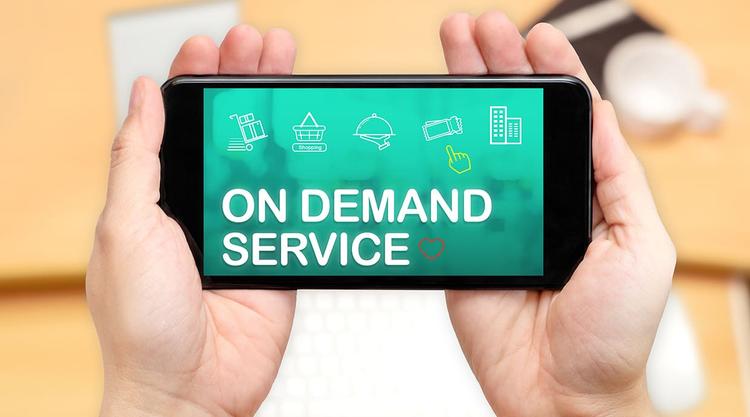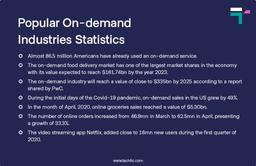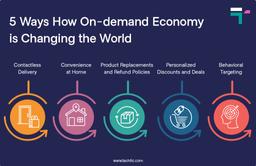5 Ways On-Demand Economy Is Changing Your Business
Sector: Digital Product
Author: Hemant Kumar
Date Published: 08/04/2020

Contents
The on-demand economy is ruling the world. A single concept has reshaped the way things have been working and functioning across industries. This industry is not just booming but expanding at rapid rates currently. Almost every major industry has welcomed the on-demand business concept and has taken steps to adopt this economy based on their specific business needs and requirements.
From groceries and apparel to logistics and entertainment, most of the activities we as consumers indulge in is on-demand. Almost 86.5 million Americans have already used an on-demand service.
For those of you who didn’t know, the on-demand food delivery market has one of the largest market shares in the economy with its value expected to reach $161.74bn by the year 2023.
And as an economy, the on-demand industry will reach a value of close to $335bn by 2025 according to a report shared by PwC. Not just that, on-demand users also collectively spend an amount of $56.7n annually buying products and services on demand.
If you feel, the pandemic might have stalled the growth and adoption of on-demand services, you are wrong. On the contrary, it has only fueled its requirements. With companies imposing strict lockdowns and shelter-in-place protocols, consumers across the globe are finding it increasingly hard to step out of their homes to get essentials and things they intend to purchase.

Even in countries where lockdown policies are lenient, people are skeptical about stepping out in the fear of contracting the disease.
In such cases, what is proving to be immensely beneficial is the on-demand economy. People are ordering groceries, gadgets, books, services, entertainment and more from their homes and getting them delivered at their homes.
During the initial days of the pandemic, on-demand sales in the US grew by 49%.
In the month of April, 2020, online groceries sales reached a value of $5.30bn. The number of online orders increased from 46.9mn in March to 62.5mn in April, presenting a growth of 33.3%.
The video streaming behemoth, Netflix, added close to 16mn new users during the first quarter of 2020 and is experiencing an enormous upsurge in streaming.
Read More: How Netflix Changed Streaming?
If you do a little more research on on-demand statistics during Covid-19, you would only realize that the economy is growing despite and during a global crisis.
And this is primarily due to the diverse range of convenience and benefits it offers to both business owners and consumers. So, if you are someone who is looking to venture into the on-demand economy by getting an on-demand app developed, here are some reasons to understand why this is the most ideal time to get started now.
5 Ways How On-demand Economy is Changing the World
As the world embraces the on-demand economy, it continues to look for emerging trends and adopt newer disruptive technologies and methodologies to consistently optimize customer experience.

Over the years, this industry has evolved keeping in mind the increasing requirements of consumers. This is one major reason why the on-demand economy is increasingly gaining new users by the day.
Let’s look at some ways it has changed the world.
1. Contactless Delivery
Amidst a viral pandemic that is costing several thousand people their lives, delivering essentials to those in need cannot be compromised as well. In such a time and scenario, one of the most effective measures taken by the companies in this economy is contactless delivery.
Considering the fact that a delivery agent is more prone to contracting the disease as they are more exposed to the outdoors, businesses are first taking care of their health and hygiene by conducting temperature checks, ensuring just the right working hours so they could get enough rest, check if their vehicles are sanitized, offer them facemasks, gloves and sanitizers, train them about the viral pandemic and its impact so they could take more informed decisions and doing more.
As part of these measures, companies are also implementing the contactless delivery process, where delivery agents would leave products and goods outside consumers’ homes and give them a call. On getting the call, customers would then pick up their products from outside. To make this more effective, companies are also suspending the cash-on-delivery payment method.
In this case, the on-demand economy is not just changing the world but changing with the world as well.
2. Convenience at Home
Again keeping the pandemic as our scenario, let us acknowledge that the on-demand economy is doing a great job in getting us things we want – from essentials to things we require to pursue a hobby. At a time when stepping out is risky and people are too skeptical to go to crowded places, delivery agents are going an extra mile risking their lives and ensuring our lifestyles are not bothered.
It is because of this convenience that most of us have become bakers, writers, podcasters, home-cooks and more during the pandemic. Behind every step in our growth, there’s an on-demand service helping us progress further.
3. Product Replacements and Refund Policies
As far as retail stores are concerned, returning a product is a big concern. You need to have the bill, go to a store, talk to the concerned associate, wait and then check out the chances of getting a product replaced. But when it comes to on-demand services, especially eCommerce, it is just a customer service request away.
Or some businesses only require customers to go to their dashboards to place a replacement order. And customers have the option to choose from credit to a complete refund. This is again done by the customers from the comfort of their homes, making on-demand services more reliable.
4. Personalized Discounts and Deals
One of the standout features of the on-demand economy is personalization. This is a feature or an edge retail stores can never have unless they bring in some form of digitization in their business. With the help of CMS and customer details, on-demand businesses can send out personalized messages through push notifications, engage and connect with their customers, listen directly to them about their queries and questions, send personalized emails on offers and announcements and do more.
It doesn’t stop there, they can also target specific customers and offer them personalized deals and discounts based on their shopping behavior. Ever imagined demanding a personalized deal in a retail store?
5. Behavioral Targeting
Behavioral targeting is an extension of the point we just discussed. It is when a business classifies and targets a specific cluster or segment of its users based on a criterion and decides to creatively engage with them. This is possible with the help of business intelligence and analytics tools that come with the apps or websites.
With data and the insights it offers, business owners can take administrative decisions to push sales, optimize customer behavior, reduce complaints, deal with negative publicity and more.
Wrapping Up
Like we said, the on-demand economy is a blessing not just for consumers but for business owners and vendors associated as well. If you intend to start an on-demand business and are looking for an on-demand app development company, get in touch with us.
We are on-demand app development experts, who have successfully rolled out several game-changing apps in the market. Talk to us about your idea and we would turn that into a revenue-yielding system.
Reach out today.
Latest Tech Insights!
Join our newsletter for the latest updates, tips, and trends.







